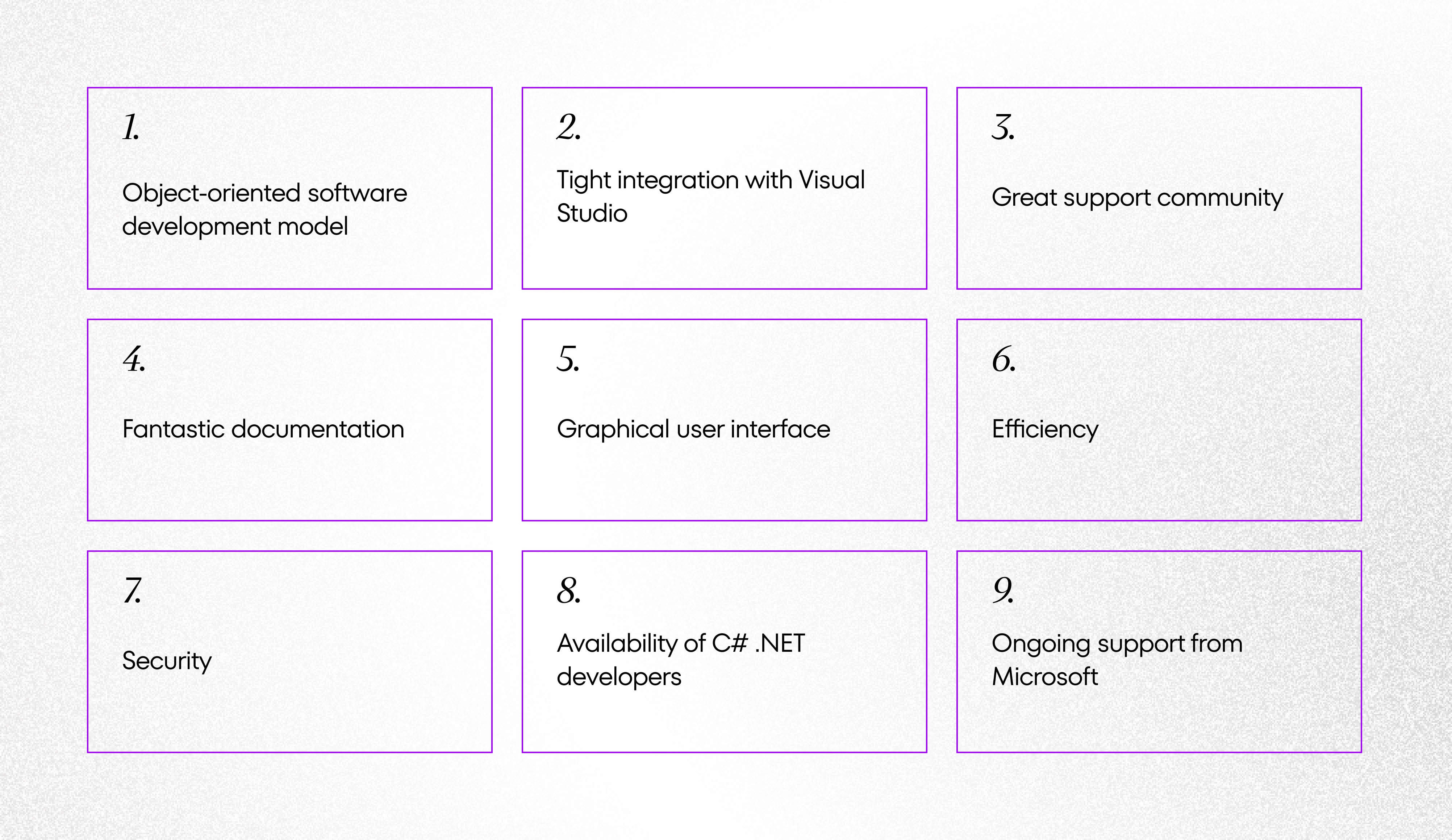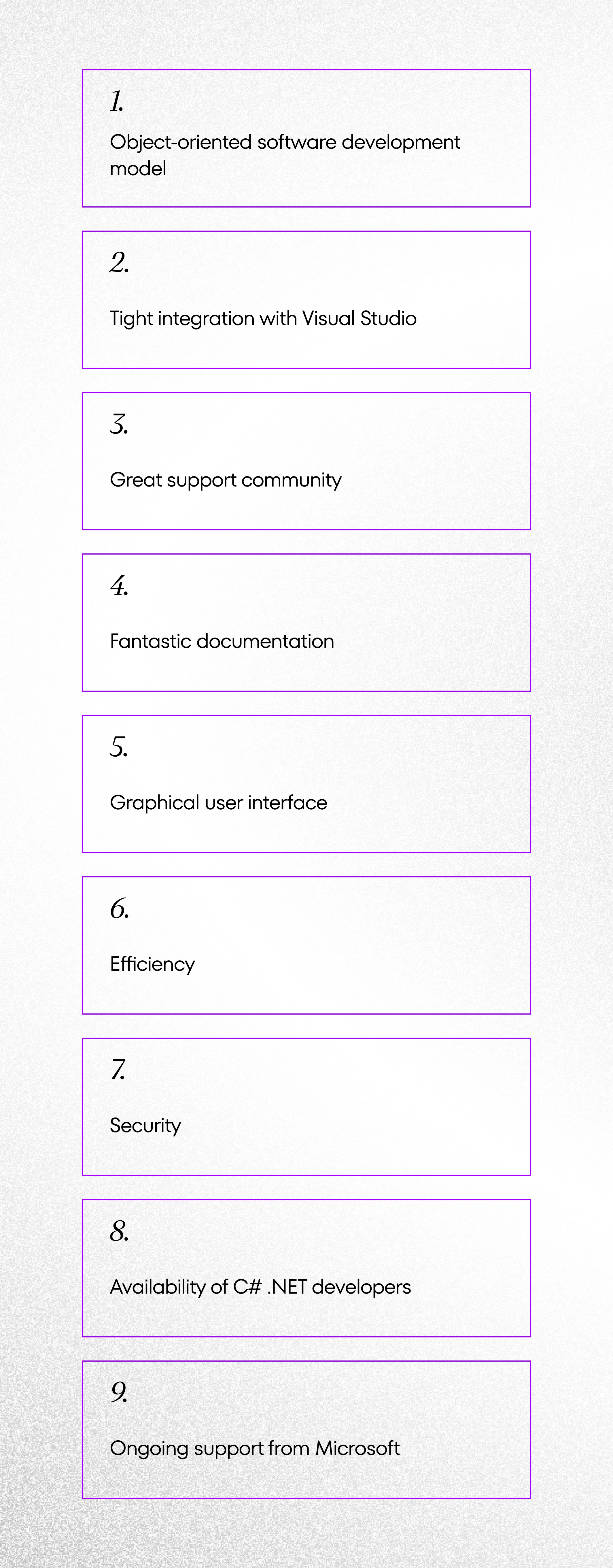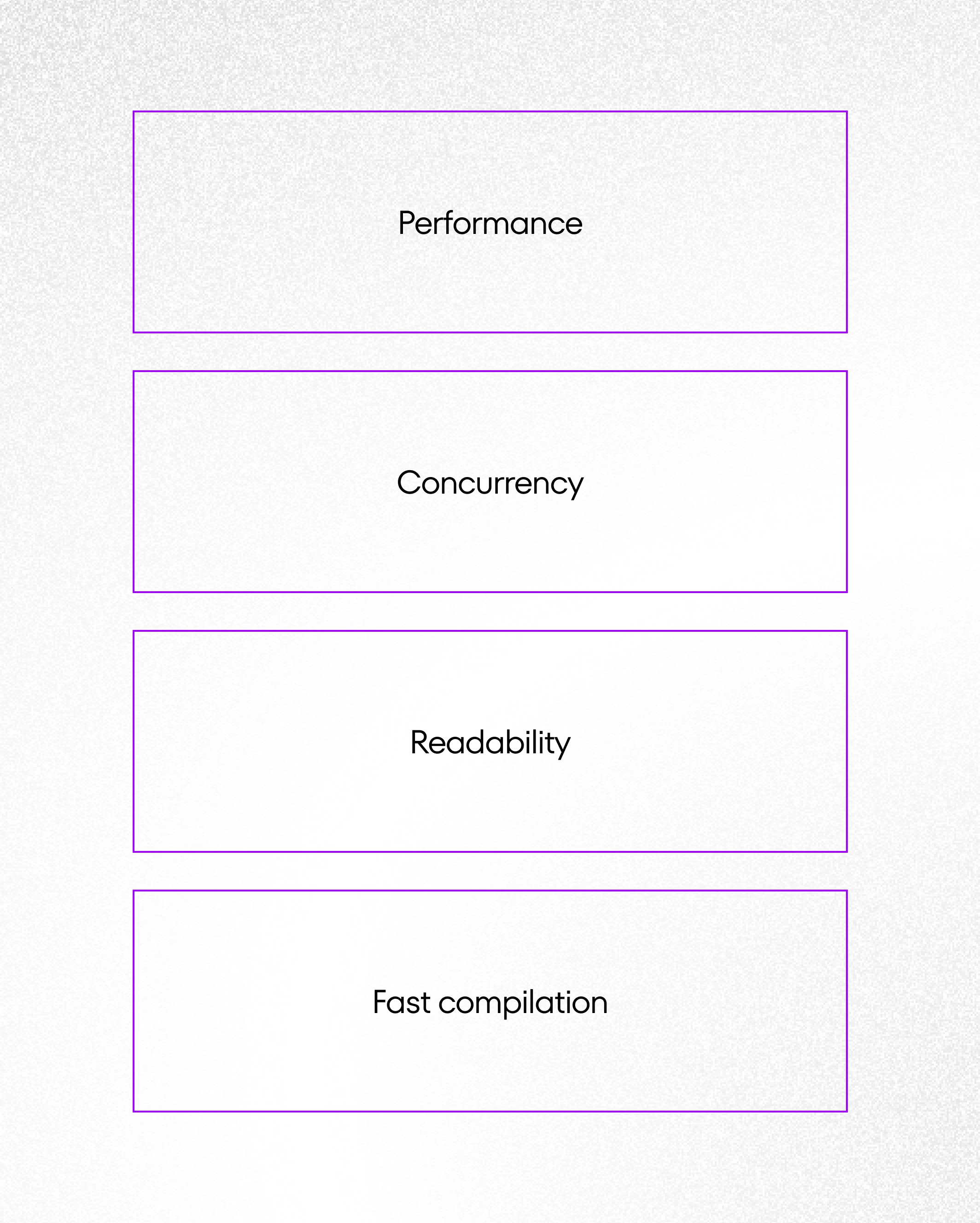April 4th, 2022 | by CSHARK
C# vs. Go – Which is Better for Your Next Application?

Table of contents
Go and C# are among the most popular programming languages. Both are versatile and perfect for web development but operate vastly differently. There may be scenarios where both Go and C# will be a good choice, so we outline the benefits of each language to guide you through your decision-making process.
Throughout the following sections, we discuss everything you need to know before choosing one programming language over another. More specifically, we explain:
- What is C#?
- What is Go?
- Go vs. C# – what do they have in common?
- Go vs. C# – key differences
- C# features missing in Go
- Questions to answer before making the decision
We hope that this article will shed some light on some of the questions you may have. However, if you don’t have the time to explore the technical aspects of your project, our digital solutions consultant can advise what will and won’t work in your case.
What is C#?
C# was created in 2000 as part of Microsoft’s .NET software development framework. It’s older than Go and thus better established. There are around 7.1 million users of this programming language.
The framework supports multiple languages. C# is an object-oriented, general-purpose programming language: you can use it to create desktop, web, mobile, and cloud-native apps.
What is Go?
Go, aka Golang, was created by Google developers in 2009. The language was born to offer a simple, fast, and readable language to handle Google’s hefty network servers. There are currently around 2 million programmers fluent in Go.
Go is a procedural, open-source language that allows building reliable and efficient software with ease. It’s ideal for building large, distributed systems that need support for high concurrency. Its type system is perfect for constructing flexible and modular programs. It’s a compiled, statically typed language working like an interpreted, dynamically typed language.
Read more: When to Choose the Go Programming Language?
Similarities Between C# and Go
C# and Go offer a unique set of similarities and differences. Firstly, let’s take a look at the characteristics and capabilities both of them share:
- Open-source
- Cross-platform development
- C language origins visible in the syntax
- A rich collection of standard libraries
- Support for asynchronous operations
- Garbage collector
- Modular programming architecture
- Similar runtime performance
Both Go and C# share the three below capabilities; however, they’re manifested in different ways:
- Compilation to native code: Go and C# compile the written application into machine code, but they do it differently. While Go compiles its code into native binaries that are bound to the operating system, C# writes it into the cross-platform binaries. You have to run the C# compiled binaries with .NET Core Runtime.
- Error handling: C# uses the classic try…catch…finally pattern. In Go, to handle errors gracefully, developers need to pass them explicitly as return arguments in functions and methods.
- Unit testing capabilities: both Go and C# have unit testing capabilities. The former programming language offers an embedded testing environment that makes testing easier to manage and includes built-in support for unit testing. C# also supports unit testing, but these must be handled more like a process that requires configuration.
Read also: What’s New in .NET? .NET 7 Guide
Comparison of C# vs. Go
Go and C# will allow you to achieve similar results, so comparing the two isn’t easy. Each of them will deliver different advantages depending on the solution you want to build. We outline the key differences below by highlighting the greatest advantages of each platform.
The Pros of C#
C # and the .NET development environment give enormous possibilities – it’s no longer devoted to monoliths only. Today, we can successfully create web applications, backend, API services or distributed systems that you can easily integrate with modern frontend frameworks such as Angular or React.


When opting for .NET software development, you’ll enjoy the following main benefits:
Object-oriented software development model
.NET embraces the object-oriented programming (OOP) development model. In essence, the model makes the code easier to combine and manage to cut both the time and cost of any software development project.
OOP is based on a modular code structure that classifies data into functional objects and then segregates them into different compartments according to their behavior. As a result, the code is simpler, much easier to use and test, as well as effective at responding to recurring problems.
Tight integration with Visual Studio
.NET framework comes with Visual Studio, Microsoft’s Integrated Development Environment. It’s a powerful platform that allows developers to build, debug, and publish applications across different platforms, including Android and iOS. It offers a broad range of tools required to write and test software and service applications written in different languages, making development (especially cross-platform) easier and more convenient for developers.
They can also benefit from Visual Studio Marketplace, which offers a wide range of editor extensions (like collaboration, essential for distributed teams), continuous integration, third-party connections) – both from Microsoft and other providers.
Great support community
Since .NET is open source, developers can rely on the support of its large community with virtually any issue they face. The entire programming community works to test, debug and improve it on an ongoing basis.
The class libraries, common language runtime, and compilers of this programming language are available on GitHub and have many contributions. In addition, there’s the .Net Foundation, a non-profit organization established to foster teamwork within the .NET community and to support an innovative, open-source ecosystem.
Fantastic documentation
Many software development companies underestimate the importance of documentation. Well-documented projects are easier to maintain in the long run, allow to track every aspect of the software development lifecycle, and are essential for knowledge transfer. C# offers excellent automated documentation capabilities. Developers define the documentation structure in XML comments, and the C# compiler produces documentation files at compile time.
Go also offers automated documentation through its godoc feature, which yields more simplified documentation as an HTML page. The process is more straightforward with this programming language.
Graphical User Interface
C# offers a native GUI solution that comes as part of .NET. Go doesn’t have its own GUI library, so developers who want to develop a GUI app would need to connect that specific library to the new application. Go provides the standard User Interface elements, so it’s suitable for building services and other infrastructure-related software components, as well as single-page apps.
Efficiency
.NET offers a powerful standard library (called .NET Standard) and a vast collection of predefined class libraries that supports simple and complex data structures. Essentially, that means developers can rely on the work of hundreds of other programmers and recycle the already-written code into their own programs instead of writing them from scratch.
.NET also offers specific libraries for security, encryption, or database access. This efficiency means businesses can cut their software development costs.
Security
C# is more established than Golang, and for that reason, it’s more secure. The .NET platform offers many different ways to protect applications written in C# against attacks. These include authorization and authentication mechanisms, packet filtering, firewalls, restrictive file permissions, the URL Scan Internet Server Application Programming Interface (ISAPI) filter, and carefully controlled SQL Server privileges. The most popular tools include Windows Authentication, Azure Key Vault Provider, Secret Manager, and DataProtection API.
Availability of C# developers
NET is a mature framework with an established position on the market and an immense user base of about 7 million professionals. .NET developers are thus relatively easier to find than Go programmers (there are only two million of them), and their rates are typically lower than those who code in Go.
Ongoing support from Microsoft
Microsoft permanently contributes to the evolution of the .NET and, as one of the leading global technology companies, they know very well what developers need and do everything they can to meet those needs. Microsoft provides users with regular support, new releases, and development updates. Companies investing in .NET applications can be sure their technology will last many years. Developers can now benefit from .NET 6, which unified APS.NET, .NET Core and Xamarin.
Read also: When .NET Framework is the Best Choice for Your Application Development and Why?
The Pros of Go
Go is becoming the standard language for building cloud infrastructure. It’s a very powerful and productive programming language that is increasingly used to handle big data and machine learning models. Compared to C#, it has a much smaller syntax that can be mastered relatively quickly. It’s perfect for backend application development, especially microservices which expose different kinds of API, such as REST, gRPC, or GraphQL.


Here are the greatest benefits of Go software development:
Performance
Although both languages perform very well (better than interpreted languages like JavaScript or Python), this excellent performance manifests differently.
In turn, Go is extremely lightweight and that’s its greatest advantage. There’s no complex code to sift through, so error handling, memory management, and compile-time checks go smoothly. Go compiles onto the binary of each machine architecture rather than using additional cross-platform runtime. What’s more, Go uses few resources, which combined with static type features, helps to better manage memory and compilation time. It also improves performance, even with the garbage collector and different features operating concurrently.
In terms of performance, Go is more powerful than C#, but that doesn’t mean, however, that C# doesn’t thrive. Quite the contrary: it’s also high-performing and is at its best when launched on Windows machines for which it’s optimized.
Concurrency
Building concurrent systems is very easy in Go via the built-in goroutines and channels, which allow executing multiple code functions simultaneously. They’re managed by Go’s runtime scheduler. Concurrency is extremely important in today’s robust software programs that need to execute its independent pieces as fast as possible without disturbing the application.
.NET also supports concurrency through its threads, tasks, and async/await commands. This process is more complicated than in Go.
Readability
The syntax in both Go vs. C# derives from the C programming language. However, Go code is minimal and far simpler to read and write, so many developers liken it to Python. Go doesn’t require a lot of time to master in comparison to C#, which is more mature and has a lot more features than Go. Golang’s specification document is only 50 pages long.
Fast Compilation
Go compiles incredibly fast thanks to quick dependencies analysis and single file loading. The compilation is done by creating an object file for every package, which is used only when somebody uses a given package. It reduces the number of reading operations on the hard drive and makes the compilation much faster than in C#.
Read also: .NET Core vs. .NET Framework
.NET Features Missing in Go
This list of features found in C# that are absent in Go is quite extensive, mainly due to the difference in the complexity of the two languages: Go is the simpler one of the two programming languages, so it offers fewer features than .NET. Here are the features we consider the most important:
Generics
Adding generics to Go has been under discussion for a while and the beta version has just recently been released. Generics aren’t yet available in a stable version of Go, but that feature should be added soon.
In addition, these are some other features that .NET developers could miss in Go:
- Sequence generators
- LINQ
- Operator overloading
- Tuples
- Expression trees
- Pattern matching
- Attributes
- SIMD intrinsic
- Dynamic binding
- Events
Not sure if Go will be the best for your project? Check how we work with companies using .NET technology.
C# vs. Go – Answer These Questions to Decide
Both C# and Go have their strengths and weaknesses. Go is well suited to building solutions for networking, big data, and cloud infrastructure. You can also use C# to create all those services as well as GUI-based endpoint applications. To decide which one to use, you should first understand your solution’s environment and what it needs to accomplish. Then, answer these two questions:
What type of app are you building?
Both Go and C# have a bandwidth that allows them to work in web development. C# is typically used in monolithic back-end web development and thrives when it comes to developing Windows desktop apps. While .NET is cross-platform, it’s strongest in a native Windows environment. On the other hand, Golang is perfect for building large-scale back-end systems and cross-platform solutions – you can build entire web servers with Go’s standard library.
C# beats Golang when it comes to game development. C# is used in the Unity game engine, and .NET itself is actually a part of the Microsoft Game Stack that comes with a comprehensive suite of tools and services for game development. The gaming engines in Go are currently rather experimental.
Are the relevant Go or .NET specialists within your immediate reach?
This is a palpable question, especially when you operate in limited timeframes. The market is currently tough, so although Go is the top language developers want to master, the current pool of talent is relatively limited. What’s more, their rates are typically higher so that may be another issue if you have a tight budget.
How to Choose Between the 2 Popular Programming Languages?
Choosing between C# vs. Go is not exactly straightforward. Both of these popular programming languages are versatile and offer similar capabilities. They’re excellent choices for cross-platform and web development. Both are open source, compile to native code, have solid error handling mechanisms, and offer a powerful garbage collector.
Go is incredibly fast and beats C# in terms of performance. It offers excellent concurrency support and is thus excellent for building scalable systems. However, C# is even more versatile than Go – it wins, especially when it comes to game development.
When deciding between Go vs. C#, understand what type of a solution you need to build and what to integrate it with. Also, think about your project budget and the experts within your reach. At CSHARK, we work with most of the popular technologies – we specialize in C# and work with Go programmers as well. However, Go developers are typically harder to find on the market and Go projects tend to cost more.
Read also: What is a Proof of Concept?


